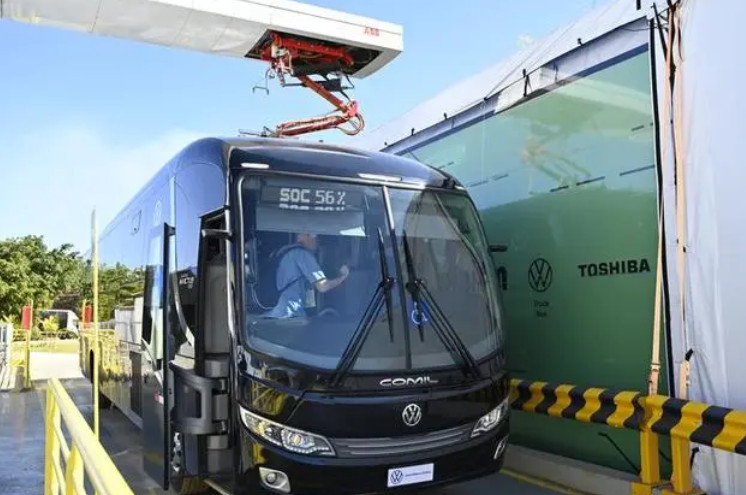
On the recent business stage, the bankruptcy of European battery manufacturer Northvolt has been like a sudden storm, not only shaking the entire electric vehicle industry chain, but also causing major damage to well-known companies such as Volkswagen and Goldman Sachs that hold its shares. This bankruptcy incident not only exposed investment risks in the field of new energy, but also triggered a profound reflection on the financial situation and investment portfolio of enterprises.
Beifu, a Swedish battery startup founded in 2016, was once hailed as the "hope of the whole village" in the European battery industry. Its ambitious plan to challenge Asian battery giants such as CATL and BYD once attracted the attention of many investors including Volkswagen, Goldman Sachs, and Siemens. These investors collectively injected over $15 billion in massive funds into Northbound, enabling it to rapidly rise to become the largest battery manufacturer in Europe.
However, the glory of Beifu did not last long. The huge setbacks encountered in production, such as the factory located in Schleswig Holstein, Sweden producing far less than expected, and BMW terminating billions of dollars in battery contracts due to quality issues, have rapidly worsened the financial situation of North Volta. In addition, issues such as poor internal management, frequent safety hazards, and divergent opinions caused by rapid expansion have exacerbated the predicament of Beifu.
As the largest and second largest shareholders of Beifu, Volkswagen and Goldman Sachs suffered huge financial losses in this storm. Volkswagen not only holds 21% of the shares in Northern Volta, but also becomes the second largest creditor of Northern Volta due to its holdings of convertible bonds worth $355 million. Goldman Sachs invested approximately $896 million in Northbound through its private equity fund, holding a 19% stake.
The bankruptcy of Beifu almost wiped out these investments. Volkswagen has had to face huge financial write downs and debt losses, while Goldman Sachs has also announced a write down of its stake in Northrop to zero. This result not only impacted the financial situation of Volkswagen and Goldman Sachs, but also had a profound impact on their investment portfolio.
The bankruptcy of Beifu provided profound investment lessons for companies such as Volkswagen and Goldman Sachs. Firstly, although the new energy sector has enormous market potential and growth prospects, it is also accompanied by high risks. This requires investors to fully evaluate factors such as project feasibility, technological maturity, and market prospects when making investment decisions, in order to avoid blindly following trends or being overly optimistic.
Secondly, for startups, rapid expansion and pursuit of scale often come with management challenges and risks. The bankruptcy of Beifu is a typical example. Therefore, investors should pay more attention to factors such as the management team, governance structure, and risk control ability when choosing to invest in startups.
In addition, diversification of investment portfolios is also an important means of reducing risk. Although Volkswagen and Goldman Sachs have invested a large amount of money in their investments in Northern Volta, they have not been able to fully diversify their investment portfolios. This leads to a serious impact on the entire investment portfolio in case of any problems in the northern region. Therefore, investors should pay more attention to the construction and management of investment portfolios to achieve risk diversification and balance.
The bankruptcy of Beifu not only had a negative impact on the financial condition and investment portfolio of companies such as Volkswagen and Goldman Sachs, but also had a profound impact on the future development of the European battery industry. As the only mainstream electric vehicle battery manufacturer in Europe, Norveg was once seen as a hope to counterbalance Asian battery manufacturers. However, its bankruptcy has caused significant setbacks for the European battery industry on its path to self-sufficiency.
This incident has also triggered the re formulation of battery industry strategies by European governments, car manufacturers, and investors in the region. Germany and other European countries have begun to seek cooperation with Asian battery manufacturers and increase their support for the local battery industry. However, achieving self-sufficiency in the European battery industry still requires time and effort.
The bankruptcy incident of Beifu has provided us with a valuable investment lesson and opportunity for reflection. Against the backdrop of rapid development in the field of new energy, investors should pay more attention to project risk assessment and management capability evaluation; At the same time, attention should also be paid to diversifying investment portfolios to reduce risks. For the European battery industry, although the bankruptcy of Norveg is a heavy blow, it also provides new opportunities and challenges for its future development. Only by constantly summarizing experiences and lessons, strengthening cooperation and innovation, can we promote the true rise and prosperity of the European battery industry.

Below is the English translation of the text, with precise handling of political terms, consistent sentence structures, and preservation of the original’s analytical tone and logical flow:
Below is the English translation of the text, with precise …
On December 15 local time, Trump took the British Broadcast…
In recent years, the application of artificial intelligence…
According to Yahoo US media reports, the recent remarks of …
After 11 years of waiting in the deep sea, we finally have …
On December 17, 2025, the newly renovated American "Preside…